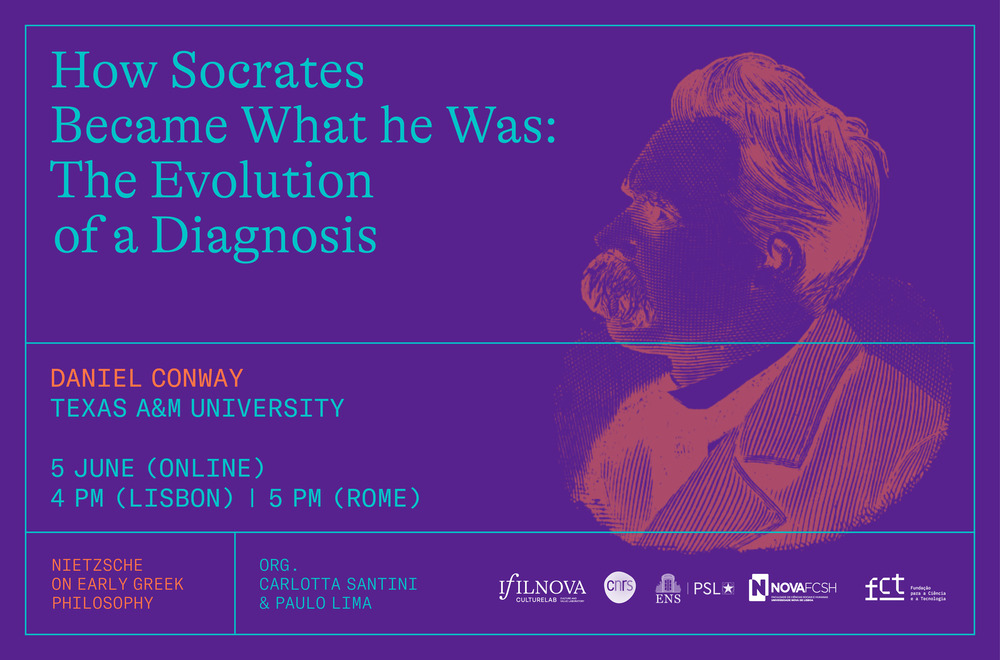Daniel Conway

5 June | 4 PM (Lisbon)
5 PM (Rome) | for other locations click here.
Abstract
To fear death, gentlemen, is no other than to think oneself wise when one is not, to think one knows what one does not.
—Socrates, Apology 29a
Précis
My aim in this presentation is twofold:
First, I will examine in detail Nietzsche’s diagnosis of Socrates in the second Section (“The Problem of Socrates”) of Twilight of the Idols (1888). In this Section, Nietzsche appears to have renounced (or resolved) the ambivalence that has characterized his treatments of Socrates up to this point. No longer concerned to express his admiration for Socrates—though he manages nonetheless to do so—or to treat the “problem” of Socrates as a persistent, solution-defying riddle, Nietzsche in this Section deploys with full force the genealogical approach he has perfected in the post-Zarathustran period of his career. Viewing the “problem” of Socrates through the lens of symptomatology, while drawing on his evolving profile of the ascetic priest, Nietzsche delivers a final, definitive diagnosis: As the “wisest” among those decadent “wise” men whose hatred of life Nietzsche exposes (Entry One), Socrates harbored no secret cure or esoteric teaching of affirmation. Exhausted from his lifelong “fight against the instincts” (Entry Eleven), Socrates finally enacted “the wisdom of his courage for death” (Entry Twelve). As his final words to Crito supposedly confirmed, “Socrates wished to die:—not Athens, he gave himself the poisoned chalice” (Entry Twelve).
Second, I will trace the evolution of Nietzsche’s diagnosis of Socrates through its various stages of articulation, wherein the “pre-Socratic” Socrates (my designation) whom he encountered as a student (and subsequently presented in his Basel lectures) eventually gave way to the life-despising decadent whose abiding “problem” he finally solved (or dissolved) in Twilight of the Idols. Nietzsche’s key insight, I offer, emerged from his realization that his tendency to regard Socrates as an enigma or puzzle, i.e., as a “problem” to be solved, effectively placed him in the company of Socrates’s devoted (but misguided) followers. Emboldened along the way by his appreciation for Aristophanes, Nietzsche ultimately mobilized what had become by 1888 his go-to interpretive gambit: Socrates was an “eroticist” (Entry Eight), to be sure, but only insofar as he was believed (by himself and others) to shelter a hidden reservoir of wisdom, as Alcibiades had famously hypothesized. In the end, Nietzsche insists, Socrates realized that he was not the “physician” of the soul he once believed himself to be: “Socrates is not a physician,” he said quietly to himself: “here, death alone is the physician…Socrates himself was just sick for a long time…” (Entry Twelve).
Hence his oft-remarked parting words to Crito (Phaedo 118): the healer Asclepius must be compensated for his role in curing Socrates of the disease that is life itself.
Daniel Conway (Department of Philosophy and Humanities, Texas A&M University, USA)
Nietzsche On Early Greek Philosophy | Online Seminar
Org. Paulo Lima (Lisbon Nietzsche Group/Research Group on Ancient Philosophy/IFILNOVA) and Carlotta Santini (CNRS/ENS, Paris)
The seminar seeks to explore the dialogue between Nietzsche and early Greek philosophy during the period when he was Professor of Philology at the University of Basel. This is a subject that has not been studied in a systematic way, although there are some decisive contributions showing its importance for understanding Nietzsche’s philological and philosophical thinking. Our purpose is to provide a platform on which contributions from specialists in Nietzsche and ancient philosophy can be presented, debated, and complemented to fill this gap in Nietzschean studies. Key topics of the sessions will be Nietzsche’s activity as a scholar of ancient doxography on early Greek philosophy, his general conception of what he called the “pre-Platonic philosophers”, as well as his interpretation of some of these philosophers. The body of texts to be studied during the sessions includes not only the published ones, but also Nietzsche’s lectures, notebooks, and correspondence. The seminar is part of the activities of the Lisbon Nietzsche Group and the Research Group on Ancient Philosophy (CultureLab/IFILNOVA). It is the result of a collaboration between IFILNOVA, the Centre Nationale de Recherche Scientifique, and the École Normale Supérieure (Paris). It will take place monthly starting from October 2023 and will have nine sessions. It will be open to all interested parties, who will be able to register for each session by contacting the organizers (plima@fcsh.unl.pt, carlottasantini@hotmail.it). For more details, please see the programme below.
Next session
Session 9 [final session]
19 June, 4 PM (Lisbon) | 5 PM (Rome) | for other locations click here.
Anne Merker (Université de Strasbourg), “Nietzsche, Heraclitus, and Polemos”
Event supported by the Foundation for Science and Technology (Fundação para a Ciência e para a Tecnologia) of the Portuguese Ministry of Education and Science under the projects UIDB/00183/2020 and UIDP/00183/2020.

